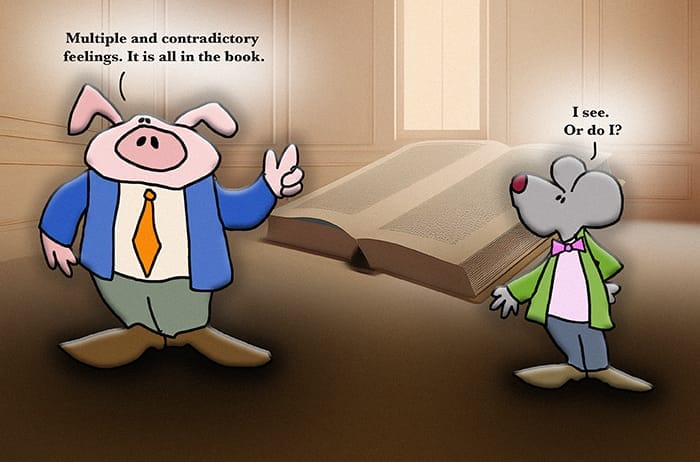I love a good word from the dictionary, as you all well know.
But some words are easier to love than others.
Like. I’m sure a lot of people love the word “chocolate.” Or they might love the word “peace.” This goes on and on. Some words bring about good feelings within us.
At the same time, though, other words do not evoke good feelings for us. Like “puke” or “toenail.” Or maybe the word falls along the lines of “abuse” or “lies.”
Nevertheless. Words shape our world, and we use them to communicate our feelings, our thoughts, and our stories. And we receive words to find out about the people and the world around us. We need words.
But what if we have mixed feelings about a word?
Like. The word:
ambivalent
It is an adjective. And the word “ambivalent” means “having or showing simultaneous and contradictory attitudes or feelings toward something or someone: characterized by ambivalence.”
Having contradictory feelings about something.
You know, I had thought that ambivalence meant that someone didn’t care about something.
But this isn’t true.
It means that they do care and don’t care at the same time.
Or they like something and hate something at the same time.
So, how did we get such a word?
The words ambivalent and ambivalence came into the English language during the early 20th century. As it happened, they originated in the field of psychology. They were introduced in German by the Swiss psychiatrist Eugen Bleuler in a 1910 publication. (So, did the dude just make them up? Or did they exist in another language, and he just put them into English? I don’t know.)
Anyway, their components are Latin rather than Germanic.
The prefix ambi- means “both.”
The -valent and -valence parts ultimately derive from the Latin verb valēre, meaning “to be strong, be effective, have worth.”
So, it is not surprising, then, that an ambivalent person is someone who has strong feelings on more than one side of a question or issue.
Wait. There’s more.
Ambiguous vs. Ambivalent
Dating to the 16th century, ambiguous is quite a bit older than ambivalent, which entered English as a loan from German in the early 20th century.
Once again, “ambiguous” was coined by the same psychiatrist dude, Eugen Bleuler. (By the way, he also introduced the term Schizophrenie, “schizophrenia,” and Autismus, “autism”). This guy was some kind of word-maker-upper.
Anyway, back to Ambiguous vs. Ambivalent. Both words are, in some fashion, concerned with duality.
Ambivalent relates to multiple and contradictory feelings, whereas ambiguous typically describes something with several possible meanings that create uncertainty.
I won’t go into the roots of the words. They seem a little ambiguous to me.
And truly, I’m ambivalent when it comes to etymology. Can’t live with etymology. Can’t live without it.
All joking aside. As I think about ambivalence, I’m having a hard time coming up with something that I’ve ever been ambivalent about. I can’t think of anything that I’ve had contradictory feelings about.
I guess maybe the closest thing is about certain people. Like when you meet them? You like them well enough, but there is something that bothers you about them?
I don’t know.
What have you been ambivalent about today or any day?
“”””””””
“Ambivalence is a wonderful tune to dance to. It has a rhythm all its own.” – Erica Jong
“”””””””
“Ambivalence is a state of suspended animation, where the mind is tossed back and forth between contradictory desires.” – William Boyd
“”””””””
“The only certainty is that nothing is certain.” – Pliny the Elder
“”””””””
It is ambiguous. I think. Maybe.
